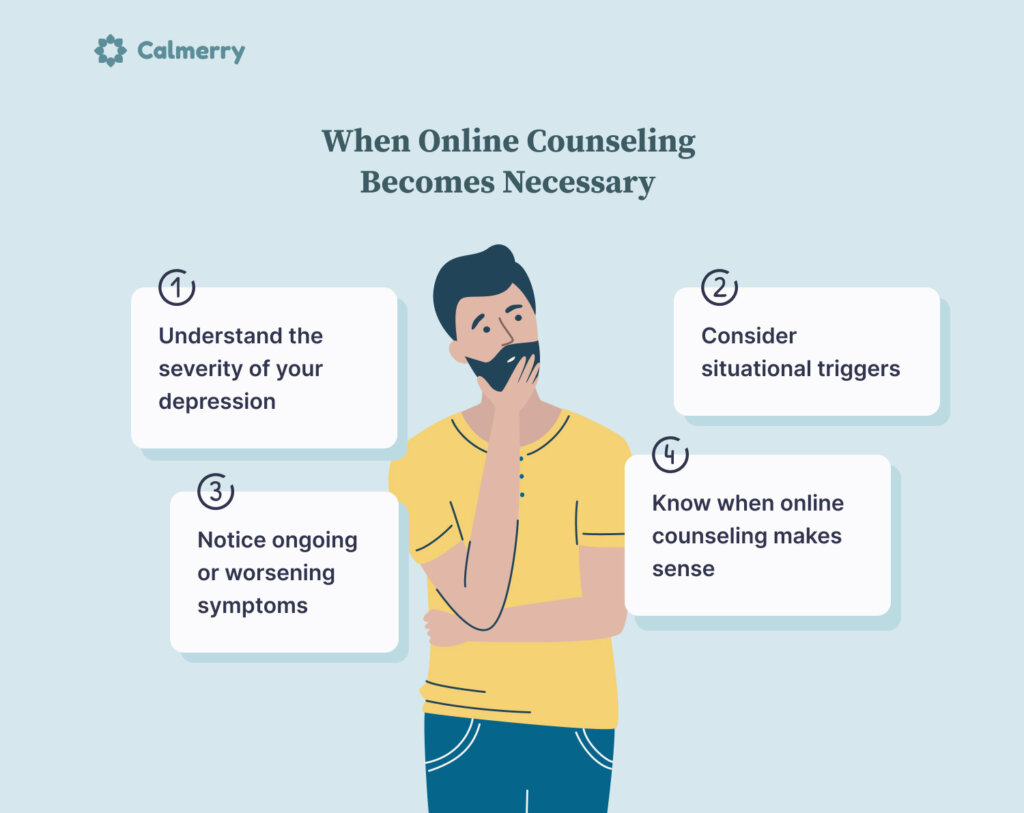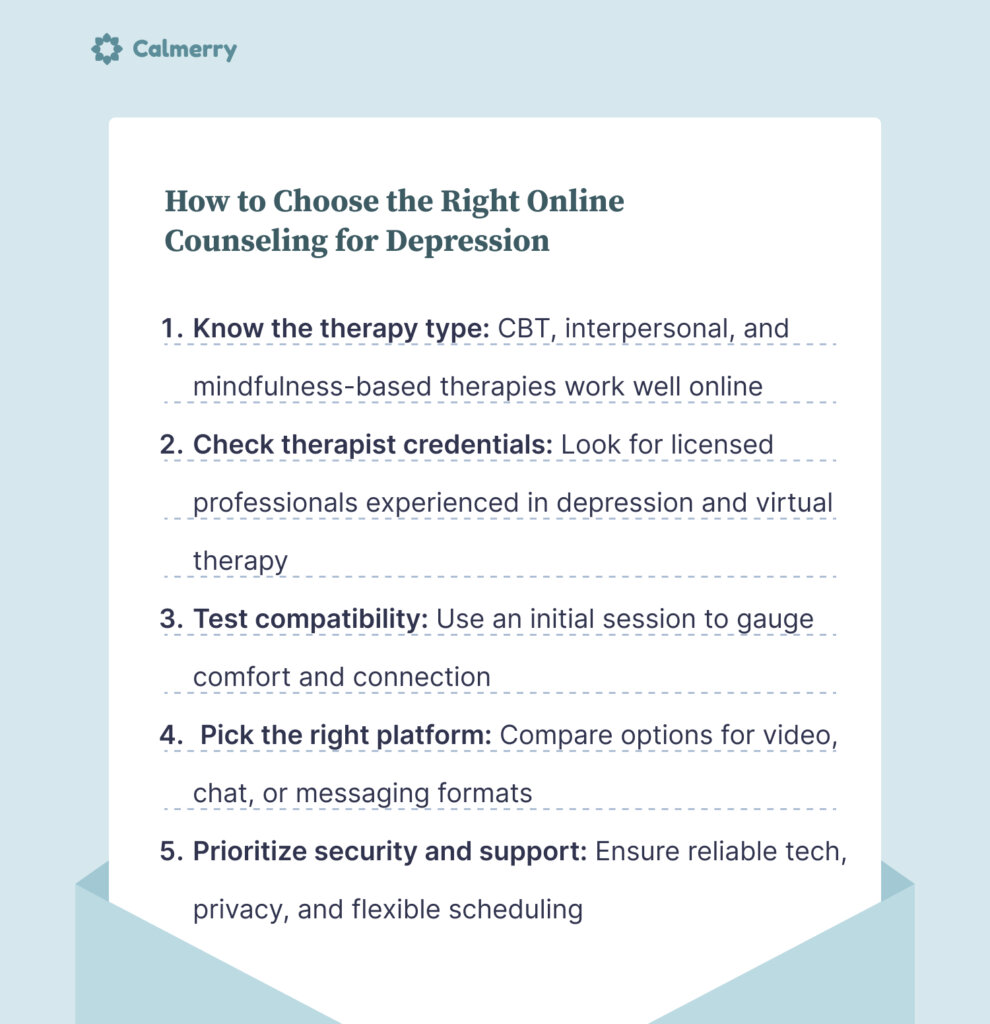Signs You Might Need Online Counseling for Depression

In this article
When low mood persists and daily life becomes increasingly difficult, recognizing when to seek professional support can feel overwhelming. Mental health challenges don’t follow a convenient schedule, and traditional barriers like geographical barriers, mobility, or time constraints shouldn’t prevent access to quality care.
Calmerry has emerged as a leading platform connecting individuals with licensed professionals, offering the best online counseling for depression from the comfort of home. Virtual therapy has transformed how we approach wellness, making therapeutic support more accessible than ever before.
Online therapy provides a bridge between struggling alone and receiving professional guidance, particularly valuable for those experiencing depressive symptoms who might otherwise face significant obstacles to care.
What is Depression? Recognizing the Signs and Symptoms
Depression is a common but serious mental health condition that affects how a person feels, thinks, and handles daily activities. Clinical depression extends far beyond occasional sadness or temporary low mood. Major depressive disorder (MDD) involves persistent symptoms that interfere with daily functioning for weeks or months.
Common symptoms of depression include overwhelming fatigue, loss of interest in previously enjoyed activities, changes in sleep patterns, difficulty concentrating, and feelings of worthlessness or guilt.
Depressive episodes can manifest differently across individuals. Some experience physical symptoms like unexplained aches, while others struggle primarily with negative thought patterns or social withdrawal. Recognizing these signs early creates opportunities for timely intervention and support.
Why Seeking Professional Help for Depression is Crucial
A qualified therapist brings specialized training in evidence-based approaches that self-help strategies alone cannot replace. Mental health professionals understand how depressive conditions interact with life circumstances, relationships, and underlying patterns that maintain distress.
Professional support becomes essential when symptoms persist despite personal efforts, interfere with work or relationships, or include thoughts of self-harm. Early intervention often prevents worsening and significantly reduces recovery time.
How Online Counseling Is Changing Mental Health Support
Mental health services have undergone a remarkable transformation over the past few decades. Where face-to-face appointments once represented the only option, technology has created innovative pathways to care. Virtual therapy emerged from necessity and evolved into a sophisticated, highly effective treatment method.
Online counseling addresses traditional therapy limitations: scheduling constraints, transportation barriers, childcare needs, and geographic limitations. Remote support has proven particularly valuable for individuals in rural areas, those with mobility challenges, and anyone who prefers the privacy of their own environment.
Key Steps to Determine When Online Counseling Becomes Necessary

Step 1: Assessing Your Depression’s Severity and Nature
Understanding the intensity and type of depressive symptoms guides appropriate treatment decisions. Mild to moderate symptoms often respond well to virtual therapy, whereas severe manifestations may initially require intensive in-person intervention.
Consider symptom duration, frequency, and impact on daily functioning. If low mood persists for several weeks, affects work performance, or strains relationships, professional evaluation becomes advisable.
Step 2: Evaluating Circumstantial Factors (Reactive Necessity)
Life circumstances sometimes create immediate barriers to traditional therapy. New parents struggling with postpartum depression, individuals with demanding work schedules, or those living in areas with limited mental health resources may find remote support the most practical option. [1] Saharoy, R., Potdukhe, A., Wanjari, M., & Taksande, A. B. (2023). Postpartum Depression and Maternal Care: Exploring the complex effects on mothers and infants. Cureus, 15(7), e41381. https://doi.org/10.7759/cureus.41381
Geographic isolation, physical disabilities, or transportation challenges can make traditional therapy inaccessible. Virtual sessions eliminate these obstacles while maintaining therapeutic quality.
Step 3: Identifying Persistent or Escalating Symptoms
When depressive symptoms remain unchanged despite personal coping efforts or begin worsening over time, professional intervention becomes crucial. Escalating patterns might include increasing social isolation, declining self-care, or emerging thoughts of hopelessness.
Pay attention to symptom progression rather than waiting for crisis points. Early intervention through teletherapy can prevent deterioration and establish effective coping strategies.
Step 4: Recognizing When Online Counseling is the Preferred Path (Proactive Necessity)
Some individuals actively prefer digital therapeutic approaches. Comfort with technology, appreciation for flexible scheduling, or desire for privacy may make virtual therapy the optimal choice from the outset.
Proactive necessity recognizes that accessibility and personal preference enhance therapeutic engagement, leading to better outcomes.
Specific Scenarios Where Online Counseling for Depression Truly Shines
Managing Mild to Moderate Major Depressive Disorder: Internet-based therapy demonstrates exceptional effectiveness for mild to moderate depressive conditions. Video calls allow therapists to observe nonverbal cues while providing convenient access to evidence-based treatments such as cognitive-behavioral therapy (CBT).
Support for Adjustment Disorders and Bereavement: Life transitions and grief responses often benefit from consistent, accessible support. Virtual sessions provide stability during emotionally turbulent periods without requiring the additional stress of travel or scheduling complications.
Addressing Co-occurring Anxiety and Social Anxiety with Depression: Depression and anxiety frequently co-occur, creating complex symptom presentations. For individuals with social anxiety, traditional therapy settings may feel overwhelming. Remote therapy reduces performance anxiety while addressing underlying depressive patterns.
Ongoing Support and Maintenance After Intensive Treatment: Following intensive treatment programs, virtual therapy provides excellent maintenance support. Regular check-ins help prevent relapse while maintaining therapeutic relationships established during more intensive phases.
When Online Counseling for Depression Isn’t Enough
Severe Depression or Acute Crisis Situations
Severe depressive episodes involving psychotic features, active suicidal ideation, or complete functional impairment typically require immediate, intensive intervention. Crises necessitate in-person evaluation and, in some cases, inpatient care.
If experiencing thoughts of self-harm, contact emergency services or crisis helplines immediately.
Complex Mental Health Conditions Requiring Integrated Care
Individuals with multiple diagnoses, substance use disorders, or complex trauma histories may need coordinated care teams. While virtual therapy can be part of treatment plans, comprehensive care often requires face-to-face coordination.
Practical Limitations and Ethical Concerns
Technology barriers, privacy concerns, or a lack of reliable internet access can limit virtual therapy effectiveness. Additionally, some therapeutic techniques require physical presence for optimal implementation.
Severe Cognitive Impairments
Significant cognitive limitations may impair the ability to engage effectively in virtual sessions, requiring specialized in-person approaches.
How to Choose the Right Online Counseling for Depression

Understanding Online Therapeutic Approaches for Depression
Cognitive behavioral therapy (CBT) translates exceptionally well to digital formats, helping individuals identify and modify negative thought patterns contributing to depressive symptoms. Other evidence-based approaches, such as interpersonal therapy and mindfulness-based interventions, also adapt effectively to virtual delivery.
Analyze different therapeutic techniques to understand which approaches align with your preferences and treatment goals.
Finding and Vetting a Qualified Online Mental Health Professional
Licensed therapists with specific training in treating depressive conditions provide optimal care. Verify credentials, specialty areas, and experience with virtual therapy delivery. Many platforms provide detailed therapist profiles, including treatment philosophies and specializations.
A strong therapeutic relationship remains fundamental regardless of delivery method. Initial consultations help assess compatibility and comfort levels.
Practicalities of Online Platforms and Services
Modern platforms offer a range of communication options: live chat, video calls, text messaging, and phone sessions. Consider which formats feel most comfortable and effective for your communication style.
Evaluate platform security, scheduling flexibility, and technical support availability. Reliable technology infrastructure supports consistent therapeutic engagement through online sessions.
Integrating Online Counseling into Your Holistic Mental Health Plan
Virtual therapy works best when integrated with comprehensive self-care approaches. Regular exercise, adequate sleep, nutritious eating, and social connections complement professional treatment. Therapy provides tools and insights, but daily wellness practices support overall recovery.
Consider how remote sessions fit within broader lifestyle patterns. Help and support from family and friends enhance therapeutic progress while professional guidance provides specialized coping strategies.
Your Mental Health Journey: What Comes Next?
Taking the first step toward professional support demonstrates courage and self-advocacy. Whether choosing virtual or traditional therapy, the most important factor is beginning the process. Many individuals discover that remote counseling provides exactly the accessibility and comfort needed for meaningful therapeutic work.
Saharoy, R., Potdukhe, A., Wanjari, M., & Taksande, A. B. (2023). Postpartum Depression and Maternal Care: Exploring the complex effects on mothers and infants. Cureus, 15(7), e41381. https://doi.org/10.7759/cureus.41381
online therapy
live video session



